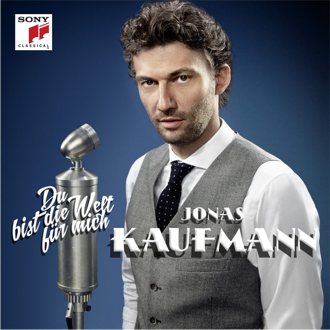|
|
|
|
|
|
|
|
|
Opera, March 2015
|
| Rodney Milnes |
|
|
|
Jonas Kaufmann—You Mean the World to Me |
| [Simon Keenlyside—Something's Gotta Give] |
 If
the words sledgehammer and nut spring to mind, they shouldn't:
neither of these greatly gifted singers displays a whiff of
condescension in the delivery of their chosen fare. They
presumably agree with Weill's pronouncement (echoing Oscar
Wilde) that there is no distinction between `serious' music and
`light' music. `There is only good music and bad music,' he
said. There is great deal of good music on both these discs. As
if to emphasize that these are far more than mere potboilers,
both are well, near-exhaustively annotated. If
the words sledgehammer and nut spring to mind, they shouldn't:
neither of these greatly gifted singers displays a whiff of
condescension in the delivery of their chosen fare. They
presumably agree with Weill's pronouncement (echoing Oscar
Wilde) that there is no distinction between `serious' music and
`light' music. `There is only good music and bad music,' he
said. There is great deal of good music on both these discs. As
if to emphasize that these are far more than mere potboilers,
both are well, near-exhaustively annotated.
[...........]
The repertory on the Kaufmann disc is taken from shows premiered
between 1925 and '35, that is to say the Silver Age of European
operetta, and Thomas Voigt's long essay examines such matters as
the tensions between the Vienna and Berlin schools, the rise in
Kálmán's successes and, arguably, decline in Lehár's; was the
latter tending to get Ideen fiber seinen Bahnhof? Voigt also
provides much useful information about the composers less
familiar to the general reader—Spoliansky, Robert Stolz, Richard
Heymann, Hans May. This is all serous stuff and, given the
printed texts, there is something to be learned. The difference
between Broadway and Europe lay in the texts to be sung.
Broadway librettists were real, imaginative writers from P.G.
Wodehouse onwards via Lorenz Hart to early Oscar Hammerstein—I
can't, hand on heart, recognize any literary quality in The
Sound of Music. But European texts too often sound like the
purest hackwork with, as we now know, banal words tacked on to
an already composed melody.
`Crossover' (dread word) is
as old as the recording industry itself. What can artists of
this stature with their experience of great music bring to
lighter fare? Something as simple as the joining together of
notes into phrases?
[.........]
Kaufmann's approach to
language is eccentrically random—we get `You are my heart's
delight' in English and French but not in German, and there
seems no logic in his other choices. What differentiates him
from other singers in this rep is the fruitiness of his lower
register, unmatched by, say, Tauber or Rudolf Schock. But
Kaufmann's shining upper register is a great asset, and his use
of head voice to caress the melodies is certainly in the
Tauber-Schock tradition. Many of the Lehár numbers were of
course composed for Tauber, and Tauber's own `Du bist die Welt
für mich' gives the disc its title—it's very much
school-of-Lehár. Kaufmann phrases these and the standard Kalman
numbers to the manner born. His sprightly account of the number
from Im weissen Rossi shows why Benatzky's operetta maintains
its hold on the repertory in Europe. Surprises? Again, I didn't
know Stolz's 'Frag nicht warum ich gehe', a smashing tune, most
winningly sung. Kaufmann is joined by Julia Kleiter for the big
duet from Die tote Stadt, not exactly an operetta, but nice to
have it. I was only surprised by Kaufmann's choice of the hearty
`Leben des Schrenk' solo to represent Künneke, a prolific and
successful composer for the theatre. Why not something from Der
Vetter cuts Dingsda? Or `Ich träume mit offenen Augen', which
I've always thought of as Künneke's greatest hit (and one of
Schock's as well). There is much pleasure to be had from these
discs, and instruction as well. A perfect combination.
|
|
|
|
|
|
|
|
|
|
|
|
|
|
|
|
|
|
|